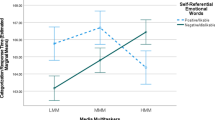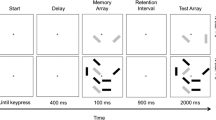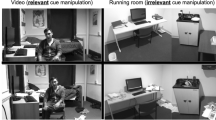Abstract
Individuals with high propensity toward media multitasking have been found to be vulnerable toward attention problems and mind wandering behavior. Their “breadth-biased” behavior style inclines them to pay attention to a large set of stimuli. As a result, they become susceptible to interferences. However in the environment, the nature of stimuli can be emotional—positive, negative, or neutral. In the realistic scenario, one may ask whether the media multitaskers follow the breadth-biased focused style or are they biased toward any one of the positive, negative, or neutral stimuli on the basis of their recurrent thoughts. The present study attempts to explore the nature of attentional bias among the high- and low media multitaskers (HMM and LMM) through the “facial dot probe task” paradigm.
Access this chapter
Tax calculation will be finalised at checkout
Purchases are for personal use only
Similar content being viewed by others
References
Anderson, J., & Rainie, L. (2013). Millennials will benefit and suffer due to their hyperconnected lives. Pew Internet and American Life Project report. Retrieved from http://www.pewinternet.org/2012/02/29/millennials-will-benefit-and-suffer-due-to-their-hyperconnected.
Bar-Haim, Y., Lamy, D., Pergamin, L., Bakermans-Kranenburg, M., & van Ijzendoorn, M. (2007). Threat-related attentional bias in anxious and nonanxious individuals: A meta-analytic study. Psychology Bulletin, 133(1), 1–24. doi:10.1037/0033-2909.133.1.1.
Becker, M. W., Alzahabi, R., & Hopwood, C. J. (2013). Media multitasking is associated with symptoms of depression and social anxiety. Cyberpsychology, Behavior, and Social Networking, 16(2), 132–135. doi:10.1089/cyber.2012.0291.
Becker, M. W., & Leinenger, M. (2011). Attentional selection is biased toward mood-congruent stimuli. Emotion. doi:10.1037/a0023524.
Bullock, A. B., & Bonanno, G. A. (2013). Attentional bias and complicated grief: A primed dot-probe task with emotional faces. Journal of Expermental Psychopathology, 4, 194–207. doi:10.5127/jep.020411.
Burke, M., & Develin, M. (2016). Once more with feeling: Supportive responses to social sharing on facebook. In CSCW ‘16. ACM. doi:10.1145/2818048
Carriera, L. M., Cheever, N. A., Rosena, L. D., Beniteza, S., & Changa, J. (2009). Multitasking across generations: Multitasking choices and difficulty ratings in three generations of Americans. Computers in Human Behavior, 25(2), 483–489. doi:10.1016/j.chb.2008.10.012.
Economakis, F. (2012). Media multitasking and depression. Retrieved from The British Psychological Society. www.bps.org.uk/news/media-multitasking-anxiety-and-depression
Greenfield, P. (2010). Social networking, mental health and human development. Paper presented at the Lab School of Washington’s 15th annual scientific research conference. Washington, DC. Retrieved from http://test.baltimorelabschool.org/content/scientificconference.
Laine-Hernandez, M., Kinnunen, T., Kusumoto, K., Kätsyri, J., Westman, S., Ravaja, N., & Oittinen, P. (2013). Multitasking influence on engagement. WP3, Personal Media Day, Deliverable 2.3.3.7.
Lin, L. (2009). Breadth-biased versus focused cognitive control in media multitasking behaviors. Proceedings of the National Academy of Sciences of the United States of America, 106(37), 15521–15522. doi:10.1073/pnas.0908642106.
MacLeod, C., Mathews, A., & Tata, P. (1986). Attentional bias in emotional disorders. Journal of Abnormal Psychology, 95(1), 15–20. doi:10.1037/0021-843X.95.1.15.
Mark, G., Wang, Y., & Niiya, M. (2014). Stress and multitasking in everyday college life: An empirical study of online. In CHI 2014. Toronto: ACM. doi:10.1145/2556288.2557361
Mathôt, S., Schreij, D., & Theeuwes, J. (2012). OpenSesame: An open-source, graphical experiment builder for the social sciences. Behavior Research Methods, 44(2), 314–324. doi:10.3758/s13428-011-0168-7.
Minear, M., Brasher, F., McCurdy, M., Lewis, J., & Younggren, A. (2013). Working memory, fluid intelligence, and impulsiveness in heavy media multitaskers. Psychonomic Bulletin and Review. doi:10.3758/s13423-013-0456-6.
Ophir, E., Nass, C., & Wagner, A. D. (2009). Cognitive control in media multitaskers. Proceedings of the National Academy of Sciences of the United States of America, 106(37), 15583–15587. doi:10.1073/pnas.0903620106.
Rideout, V., Foehr, U., & Roberts, D. (2010). Generation M2: Media in the lives of 8–18-year olds. Menlo Park (CA): The Henry J Kaiser Family Foundation. Retrieved from http://www.kff.org/entmedia/upload/8010.pdf.
Setty, S., Husain, M., Beham, P., Gudavalli, J., Kandasamy, M., Vaddi, R., Hemadri, V., Karure, J. C., Raju, R., Rajan, B., Kumar, V., Jawahar, C. V. (2013). India movie face database: A benchmark for face recognition under wide variations. In Computer vision, pattern recogniton, image processing and graphics (NCVPRIPG) (pp. 1–5). Jodhur: IEEE.
Shih, S.-I. (2013). A null relationship between media multitasking and well-being. PLoS ONE, 8(5). doi:10.1371/journal.pone.0064508.
Song, K.-S., Nam, S., Lim, H., & Kim, J. (2013). Analysis of youngsters’ media multitasking behaviors and effect on learning. International Journal of Multimedia and Ubiquitous Engineering, 8(4), 191–198. Retrieved from www.sersc.org/journals/IJMUE/vol8_no4_2013/19.pdf.
Uncapher, M., Thieu, M., & Wagner, A. (2016). Media multitasking and memory: Differences in working memory and long-term memory. Psychonomic Bulletin Review, 23(2), 483–490. doi:10.3758/s13423-015-0907-3.
Van der Schalk, J., Hawk, S. T., Fischer, A. H., & Doosje, B. (2011). Moving faces, looking places: Validation of the Amsterdam dynamic facial expression set (ADFES). Emotion, 4, 907–920. doi:10.1037/a0023853.
Voorveld, H., Seijn, C., Ketelaar, P., & Smit, E. (2014). Investigating the prevalence and predictors of media multitasking across countries. International Journal of Communication, 8, 2755–2777.
Xu, S., Wang, Z., & David, P. (2016). Media multitasking and well-being of university students. Computers in Human Behavior, 55, 242–250. doi:10.1016/j.chb.2015.08.040.
Yang, X., Xu, X., & Zhu, L. (2015). Media multitasking and psychological wellbeing in Chinese adolescents: Time management as a moderator. Computers in Human Behavior, 53, 216–222. doi:10.1016/j.chb.2015.06.034.
Acknowledgments
The author thanks Human Factors and Applied Cognition Lab at Indian Institute of Technology Indore for all the technical and experimental support during the execution of this project and acknowledge UGC, Government of India for support.
Author information
Authors and Affiliations
Corresponding author
Editor information
Editors and Affiliations
Rights and permissions
Copyright information
© 2016 Springer Nature Singapore Pte Ltd.
About this paper
Cite this paper
Shukla, S. (2016). Media Multitaskers and Attentional Bias Toward Emotional Stimuli. In: Leung, MT., Tan, L. (eds) Applied Psychology Readings. SCAP 2016. Springer, Singapore. https://doi.org/10.1007/978-981-10-2796-3_3
Download citation
DOI: https://doi.org/10.1007/978-981-10-2796-3_3
Published:
Publisher Name: Springer, Singapore
Print ISBN: 978-981-10-2795-6
Online ISBN: 978-981-10-2796-3
eBook Packages: Behavioral Science and PsychologyBehavioral Science and Psychology (R0)




